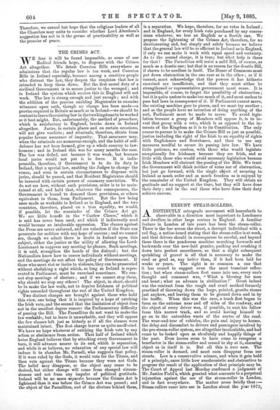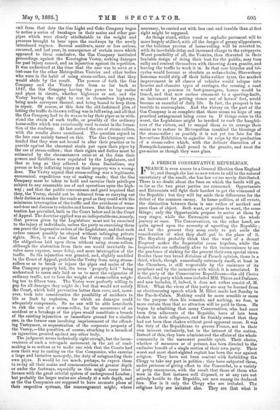EXEUNT STEAM-ROLLERS.
ADISTINCTLY retrograde movement will henceforth be observable in a direction most important to Londoners and dwellers in other large centres in England. A familiar feature in London of late years has been the steam-roller. There is the bar across the street, a decrepit individual with a red flag, a notice-board stating that the steam-roller is at work, and that drivers should in consequence be careful, and beyond these there is the ponderous machine marching forwards and backwards over the new-laid granite, packing and crushing it down into perfect smoothness, so that a slight subsequent sprinkling of gravel is all that is necessary to make the road as good as, nay better than, if it had been laid for weeks or years. The sight is so common a one that it has ceased to suggest even the most transient reflection; but when steam-rollers first came into use, every one's thought and comment was, "What a blessing for man and beast ; what an advance in civilisation !" Great indeed was the contrast from the rough and cruel method formerly practised of throwing down the large, pointed, granite stones just anyhow, and leaving them to be ground down and in by the traffic. When this was the case, a track first began to form on the extreme near and off sides of the roadway, and the object of every driver was, if possible, to oust his fellow from this narrow track, and so avoid having himself to go on to the untrodden waste of the centre of the road. The wear-and-tear of vehicles, the pain and injury to horses, the delay and discomfort to drivers and passengers involved by the pre-steam-roller system, are altogether incalculable, and had come to be looked upon as absolutely and happily things of the past. Even horses seem to have come to recognise a benefactor in the steam-roller and ceased to shy at it, alarming object as in itself it is. But all this is over now. The steam-roller is doomed, and must soon disappear from our streets. Law is a conservative science, and when it gets hold of a principle, cares little how anachronistic and obstructive to progress the result of the application of that principle may be. The Court of Appeal last Monday confirmed a judgment of Mr. Justice Field's, which granted what amounts to a perpetual injunction against the use of the steam-roller in London, and in fact everywhere. The matter arose briefly thus :— Steam-rollers came into use in London about the year 1872,
and from that date the Gas Light and Coke Company began to notice a series of breakages in their mains and other gaspipes which were clearly attributable to the weight and pressure brought to bear upon the roadways by the newly introduced engines. Several accidents, more or less serious, occurred, and last year, in consequence of certain cases which appeared to them conclusive, the Gas Company instituted proceedings against the Kensington Vestry, seeking damages for past injury caused, and an injunction against its repetition. It was understood at the time that the case was to serve as a test-case for the other Metropolitan Vestries and other bodies who were in the habit of using steam-rollers, and that they would abide by the result. The powers of both the Gas Company and the Vestry date from as far back as 1847, the Gas Company having the power to lay mains and pipes in streets, whether highways or not, and the Vestry having the right to vest in themselves highways, being made surveyors thereof, and being bound to keep them in repair. Of course, at this date the old-fashioned plan of letting the traffic do its own rolling was in full swing, and all that the Gas Company had to do was so to lay their pipes as to withstand the strain of such traffic, or possibly of the ordinary horse-roller which was occasionally used to assist in the formation of the roadway. At last arrived the era of steam-rollers, with the results above mentioned. The question argued in the late case mainly turned on this. The Gas Company contended that they were not bound to alter their practice or to provide against the abnormal strain put upon their pipes by the use of steam-rollers ; that their rights and duties must be estimated by the circumstances existent at the date their powers and liabilities were regulated by the Legislature, and that so long as they adhered to these limitations, any person or body inflicting injury on their property was a wrongdoer. The Ve3try argued that steam-rolling was a legitimate, economical, expeditious way of making roads ; that the Gas Company must be taken to hold and exercise their privileges subject to any reasonable use of and operations upon the highway ; and that the public convenience and good required that they, the Vestry, should not be debarred from so carrying out their duties as to render the roads as good as they could with the minimum interruption of the traffic and the avoidance of wearand-tear and distress to vehicles and horses. But the former contention has prevailed, both in the Court below and in the Court of Appeal. The doctrine applied was an indisputable one, namely, that powers given by the Legislature must not be exercised to the injury of individuals, unless the party so exercising them can prove the imperative orders of the Legislature, and that such orders cannot possibly be obeyed without infringing private rights. Now, it was clear that the Vestry could discharge the obligations laid upon them without using steam-rollers, although the abstention from their use would inevitably involve more expense, more delay, and more interruption of the traffic. So the injunction was granted, and, slightly modified in the Court of Appeal, prohibits the Vestry from using steamrollers so as to break or injure the pipes and mains of the Gas Company properly laid, the term "properly laid" being understood to mean only laid so as to meet the exigencies of ordinary traffic, not to bear the weight of steam-rollers weigh ing ten to fifteen tons. The Vestry were perfectly willing to pay for all damages they might do ; but that would not satisfy the Court, which held prevention better than cure, and, moreover, took into consideration the possibility of accidents to life or limb by explosion, for which no damages could adequately compensate. So no one will be able henceforth to risk the use of a steam-roller, for the occurrence of an accident or a breakage of the pipes would constitute a breach of the existing injunction or immediate ground for a similar one, in the former case involving imprisonment of the offending Vestrymen, or sequestration of the corporate property of the Vestry,—like panalties, of course, attaching to a breach of an iajunction granted against any other body.
The judgment seems technically right enough, but the inconvenience of such a retrogade movement iu the art of roadmaking is so serious as to make one wish that the Courts had seen their way to casting on the Gas Companies, who exercise a large and lucrative monopoly, the duty of safeguarding their own pipes. It would be too much, perhaps, to expect them to re-lay all their mains and communications at greater depth or under the footways, especially as this might cause interference with the great arterial system of underground London ; but probably the larger mains are already at a safe depth, and as the Gas Companies are supposed to have accurate plans of their respective systems, the rearrangement might, where
necessary, be carried out with less cost and trouble than at first sight might be supposed. As things stand, either wood or asphalte pavement will be more largely utilised, with all the danger of greasy slipperiness, or the toilsome process of horse-rolling will be reverted to, with its inevitable delay and increased charge to the ratepayers. Worst possibility of all, the Vestries, thus thwarted in their laudable design of doing their best for the public, may turn sulky and content themselves with throwing down granite, and leaving the traffic to work it in. In that case bicycles and tricycles would become as obsolete as sedan-chairs, Shrewsbury hansoms would strip off their india-rubber tyres, the marked improvement in all classes of vehicles would relapse into heavier and clumsier types of carriages, the crossing a road would be a penance to foot-passengers, horses would be lamed, and that now useless ornament to a sporting-knife, an instrument for getting stones out of horses' feet, would become an essential of daily life. In fact, the prospect is too terrible to contemplate. And the victory on the part of the Gas Company is so complete that there seems no hope of any practical arrangement being come to. If things come to the worst, the Legislature might be invoked to curb the haughtiness of the victors, and to compel them so to arrange their mains as to restore to Metropolitan mankind the blessings of the steam-roller ; or possibly it is not yet too late for the Inventions Exhibition to signalise its reign by the production of a steam-roller which, with the delicate discretion of a Nasmyth-hammer, shall pound in the granite, and treat the gas-mains as though they were glass.



































 Previous page
Previous page